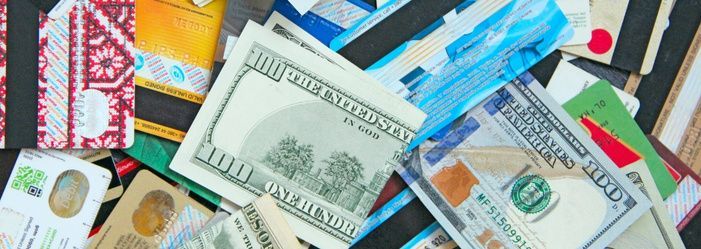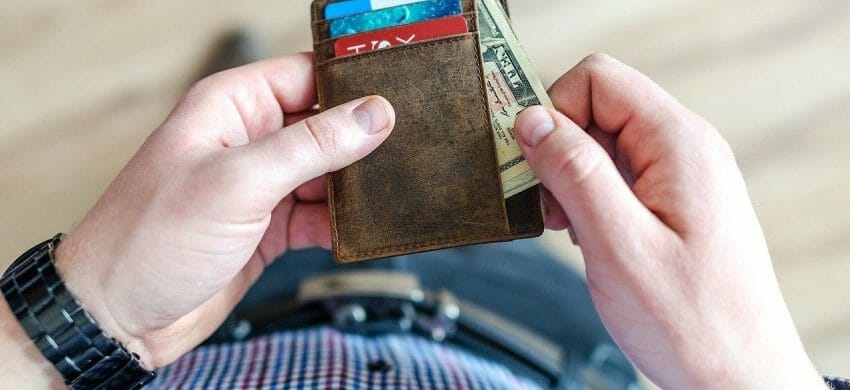Last Updated: March 12, 2024
Cash or Credit?

Disclaimer: We are not qualified legal or tax professionals and are not giving advice. Always speak with a qualified professional before making any legal or financial decisions.
Deciding between cash and credit can often feel like navigating a financial maze. With each payment method offering its unique set of benefits and drawbacks, the choice isn't always straightforward.
In this guide, we'll dive into the pros and cons of using cash versus credit, helping you make informed decisions that align with your financial habits and goals. Whether you're looking to manage your spending, maximize rewards, or simply understand which option fits your lifestyle, join us as we explore the key considerations that will guide your choice.
If you'd rather speak to a debt specialist now, click here for a free consultation.
Limits Overspending
If you have trouble with keeping to a budget, using cash can help you not to spend. You have a tangible amount of cash to spend. If you depend on an ATM for cash, you may see some pretty hefty ATM fees that will eat into your budget.
Another great strategy is to give yourself a cash allowance for discretionary spending. When it is gone, it is gone and there is no cheating. It takes a bit of self-discipline, but it can be a very effective way to not eat into your money meant for important things like food and rent.
Using a credit card is a very simple way to fall into credit card debt. It is very simple to pull out the ole credit card and plan to pay it later without a plan to actually do so. The problem is that life events will inevitably occur that prevent you from paying off your credit card balance. If you create and build an emergency fund, use that money for true emergencies and keep your credit card balance at zero.
If you have issues with credit card overspending, cash may be the perfect solution to sticking with a budget. If you have automatic payments to a streaming service or other vendors, you may want to remove them from your checking account and pay them with a cash-back credit card. It protects your bank account from accidentally getting overdrawn and paying your credit card in full and on time will help you build a good credit rating – something that using cash can not help you with
Protects Against Fraud
It is relatively simple for hackers to steal credit card numbers either over the internet or in person. Cash, as long as you don’t accidentally pick up a counterfeit bill, is hard to hack. Of course, if your cash is stolen, you generally don’t have much recourse to get it back.
Using a credit card usually comes with fraud protection. Fraud protection on debit cards is more dubious, so always place a daily limit on how much money can be withdrawn using your debit card.
Try to keep your credit and debit cards in RFID sleeves or wallets. This simple protection can prevent your cards from being hacked when they are supposedly secure and not being used. RFID sleeves are very inexpensive.
Cash is Accepted Everywhere
Well…Usually. Some vendors, especially in larger cities are going cash-free. A cash-free society means that the till is safe from thieves and cashiers are not required for change.
In addition, you will need a credit card or debit card to purchase plane tickets, hotel rooms, or rental cars. For these types of purchases, we recommend using a credit card because a debit card will have a hold put on your cash, especially for hotel rooms. That hold can ruin a vacation quickly!
On the other hand, if you are making small purchases, using cash makes more sense than a debit or credit card with associated usage fees. If you are using cash, get a receipt. Otherwise, you have no record that you actually paid a bill!
Mobile Payments Are Not As Popular
Mobile payment sites are gaining popularity, but especially with older consumers, there appears to be resistance to trusting the internet with placing the payment properly. Cash still retains a sense of security that the money got where it was going.
If you travel overseas, especially to developed nations, you will find that digital payments are far more popular and common for practically everything. Eventually, that trend will reach the United States. However, given how our banking system and the internet is set up, rural, or marginalized people will be the last to be able to go cash-free.
Cash is not Traceable
In a world where our every purchase is recorded, analyzed, and used to market to us, cash is uniquely untraceable. Using cash and avoiding frequent buyer apps can help you drop off the radar from marketers. Of course, that means that you have to either buy everything locally or travel to make purchases.
As a warning against carrying large sums of cash – if you are stopped by police, they can and will seize your cash as suspected drug or laundering proceeds. It can be a very long and expensive fight to get back that money.
If you are buying an expensive item, you may want to use a credit card (and then immediately pay it off). You may get an additional warranty and purchase protection. Plus you won’t have to carry large amounts of cash. Plus, if you have cashback or a rewards card, you will earn points for your purchase.
Pocket Full of Change
If you’re using cash, get ready to have a lot of change. Set up a change jar and then use the accumulated change for a splurge, pay down a bill, or buy something you have wanted without hurting your budget. FYI – a wine bottle can hold about $400 in dimes!
You can’t do that with a credit card.
Comparing Cash vs. Credit
When deciding whether to use cash or credit for purchases, it helps to compare the pros and cons directly. Here is an overview of some of the key differences:
| Feature | Cash | Credit Card |
|---|---|---|
| Security | No fraud protection or ability to dispute fraudulent charges | Strong fraud/purchase protections and ability to dispute charges |
| Budgeting | Limits overspending for some people | Makes it easy to overspend |
| Acceptance | Accepted at most retailers but not for online purchases | Accepted at more locations including online |
| Rewards | No opportunity to earn rewards | Chance to earn cash back, points, miles, etc. on spending |
As you can see, both payment methods have advantages and disadvantages to consider based on your financial situation and spending tendencies. For those who tend to overspend, cash may be better for reining in budgets. But credit cards offer more flexibility, security, rewards, and other benefits.
Maximizing Credit Card Rewards
If you do opt to use a credit card, make sure you choose one that aligns with your spending patterns to maximize potential rewards. Consider cards with bonus categories that match your top monthly expenses.
For example:
- Groceries: Amex Blue Cash Preferred offers 6% back at US supermarkets
- Dining: Chase Sapphire Preferred offers 3x points on dining
- Gas: Bank of America Customized Cash Rewards card offers 3% back on gas
You’ll also want to pay attention to where you redeem your credit card rewards. Transferring points to airline and hotel loyalty programs often delivers the best per-point value. Or use your points for statement credits to offset future card purchases. Be sure to read our article on how to use credit cards wisely.
Choosing the Right Card for You
With hundreds of credit cards on the market, how do you pick the ideal one?
The most important factors to evaluate include:
- APR: Ideally under 20% if carrying a balance
- Fees: Avoid cards with annual fees unless big benefits
- Rewards: Match to your top spending categories
- Perks: Look for bonus offers, travel protection, etc.
- Company reputability: Stick to major issuers like Visa, Amex
Balance transfer cards can also help consolidate high-interest debt onto a single card with a low introductory APR. Take a look at our picks for the Zero Percent APR Balance Transfer to Pay Off Credit Cards to explore your options.
Be sure to read our credit card tips section for more guidance on choosing the optimal card for your financial situation. Good credit card habits take discipline, but the rewards can be well worth it!
FAQs
Conclusion
Deciding whether cash or credit is the better option depends largely on your financial discipline and spending tendencies. For those who struggle to control budgets, sticking to cash can rein in overspending. However, credit cards offer more flexibility, security, reward potential, and other advantages not available with cash.
Ultimately, neither cash nor credit cards are inherently good or bad. How responsibly you manage them is what matters. For most, a combination approach makes the most sense. Use cash where merchant fees are high or you may emotionally overspend. Rely on credit strategically where rewards are highest, fraud protections apply, or convenience is better.
The key is tracking your habits truthfully. If you tend to carry balances, consider phasing out credit card reliance until you address that. If you’ve shown money management prowess, maximize modern payment tech through cards responsibly. Find the right blend based on your financial behaviors. Tools only work when used properly; understand how you truly operate before deciding.
Pacific Debt, Inc.
If you have overused your credit cards and find yourself deep in debt, you may need more help. If you’d like more information on debt settlement or have more than $10,000 in credit card debt that you can’t repay, contact Pacific Debt, Inc. We may be able to help you become debt-free in 2 to 4 years.
*Disclaimer: Pacific Debt Relief explicitly states that it is not a credit repair organization, and its program does not aim to improve individuals' credit scores. The information provided here is intended solely for educational purposes, aiding consumers in making informed decisions regarding credit and debt matters. The content does not constitute legal or financial advice. Pacific Debt Relief strongly advises individuals to seek the counsel of qualified professionals before undertaking any legal or financial actions.
Reduce Your Credit Card Debt By Up to Half

BBB Reviews | 4.9/5.0 Rating









 Do Not Sell My Personal Information
Do Not Sell My Personal Information